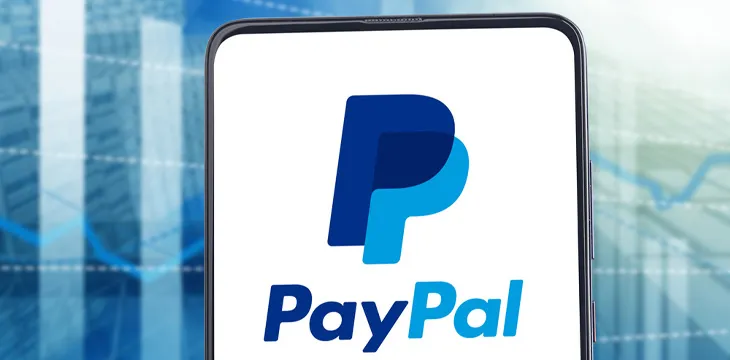|
Getting your Trinity Audio player ready...
|
It has been quite a weekend for PayPal (NASDAQ: PYPL). The publicly-listed online payments processor and financial services company set off a media storm on Saturday, when it published an update to its acceptable use policy (AUP) that would have granted it the ability to effectively fine its users US$2,500 per offense for “misinformation,” as well as a host of other newly listed transgressions added to its existing list of prohibited offenses that the company deemed to present risks to the “wellbeing” of its userbase.
The changes, which were due to come into effect on November 3—less than a month after first being posted—would have given PayPal “sole discretion” in administering these infractions, which in all likelihood would have come with the added kicker of the user being de-platformed from using its services.
Such was the swift and fiery reaction from the public, that less than 12 hours after first being reported by The Daily Wire—a popular conservative mouthpiece and publication—PayPal was forced to walk the policy back, characterizing the publication of the new policy as unintentional and altogether erroneous.
“An AUP notice recently went out in error that included incorrect information. PayPal is not fining people for misinformation and this language was never intended to be inserted in our policy,” an unnamed spokesperson for PayPal told the National Review.
“Our teams are working to correct our policy pages. We’re sorry for the confusion this has caused.”
Now, if you believe that the policy “went out in error” and wouldn’t have remained in place and been acted upon in the absence of public outcry, then I have a bridge to sell to you. That’s because, despite the backlash this latest overreach from PayPal drew, it’s far from the first time that the company has played the role of judge, jury, and executioner when it comes to freezing funds and de-platforming users—with a laundry list of examples—be they independent media outlets and associated journalists, legal cannabis and adult entertainment companies, even WikiLeaks—who have all purportedly fallen afoul of the payment processor’s guidelines.
And you can be sure that this time won’t be the last, either—next time, they’ll just be more calculated and clever about it.
But, this latest misstep once again illustrates just how much the world needs Bitcoin—the proper Bitcoin that is, rather than the speculative instrument without utility masquerading as Bitcoin using the BTC ticker. Because, let’s be clear, having your personal money (or that of your business) subjected to the unchecked power of a self-installed centralized authority—be that a company like PayPal or a cabal of rogue developers like with BTC—is never going to produce optimal outcomes for honest people, intentional or otherwise.
That’s simply an inarguable fact.
Rather, as the creator of Bitcoin and father of blockchain technology, Dr. Craig Wright, is demonstrating with a litany of positive litigation, due process is a pre-requisite for a well-balanced and properly functioning society—which, of course, includes our finances. That’s because, despite the rhetoric of BTC bag holders, who would have you convinced that digital assets exist entirely outside of the purview of governments and law enforcement agencies, it’s just not the case.
In recent years, we have seen countless cases of law enforcement confiscating ill-gotten digital assets, be it BTC, ETH, NFTs, or something else entirely. In essentially all of these cases, however, either the criminal has had the assets directly taken via their private keys or due to the involvement of law-abiding, KYC-requiring, digital asset exchanges.
But law enforcement is soon to have an all-new tool at their disposal in reigning in the wild west of “cryptocurrency”, so long as—crucially—due process is followed.
Last week, the Bitcoin Association for BSV announced the launch of its self-developed Blacklist Manager—a software tool to enable miners on the Bitcoin network to freeze lost or stolen coins as required by court order – which is widely expected to be followed by tools to aid in the recovery of these assets.
“The introduction of the Blacklist Manager tool is a sign of the maturing blockchain space. If we want to have a massive adoption of blockchain technology by the corporate world, large firms, banks, and governments, there needs to be a way to recover lost or stolen assets,” said Marcin Zarakowski, General Counsel and Chief of Staff at Bitcoin Association for BSV.
“Without this, blockchain technology will not be massively adopted but will continue to be used as a layer for hosting asset classes used primarily for trading and speculation. We have heard that many times from large players. We are heavily scrutinized when it comes to compliance and we can’t allow digital assets to sit on the blockchain where a court order has been issued or a crime has been committed.”
Exactly when the Blacklist Manager will first be used—be it on the BSV blockchain or implemented on another blockchain—for now, remains unclear. Dr. Wright has already scored a victory that would validate its use in returning coins to Bitcoin’s creator that were stolen in a daring hack at his own home, but there is purported to be a long list of wronged parties eager for the return of the digital assets that rightfully belong to them.
Make no mistake, the law is coming to Bitcoin and it will set about a significant paradigm shift around what is and what is not possible in the world of digital assets.
But, back to PayPal, as they’re definitely not out of the frying pan just yet.
That’s because the impact of PayPal’s latest misstep may end up being much more far-reaching and ultimately detrimental to the future of their business than they could have ever predicted when their legal eagles were busy drafting up changes to their AUP. And despite the quick change of course in this case and the incoming public relations blitz that is sure to follow, it may not be enough.
In fact, so egregious was the latest attempted power grab by PayPal, its co-founder and former CEO (and prospective Twitter purchaser), Elon Musk, who has remained on relatively good terms with the company—especially in the public eye—took to the social media platform to publicly criticize the move and chastise the company’s latest overreach.
It’s hard for me to openly criticize a company I used to love and gave so much to. But @PayPal’s new AUP goes against everything I believe in. A private company now gets to decide to take your money if you say something they disagree with. Insanity. https://t.co/Gzf8faChUb
— David Marcus (@davidmarcus) October 8, 2022
Agreed
— Elon Musk (@elonmusk) October 8, 2022
Musk also engaged with a comment that posited the “X platform” as the solution, a (presumably) yet to be created service that he described as “the everything app” – which he first hinted at in a Tweet following the about-face made last week when he once again agreed to purchase Twitter, just days out from a two-day deposition he was facing as part of pre-litigation information gathering in the Twitter-led court case aimed at forcing his hand on the purchase.
Worrying. That's why we need the X platform more than everhttps://t.co/m2P0pl7r3k
— Andrea Stroppa 🐺 Claudius Nero's Legion 🐺 (@andst7) October 8, 2022
💯
— Elon Musk (@elonmusk) October 8, 2022
Interestingly, the X name is nothing new for Musk. His second venture after exiting from his first successful start-up, Zip2—an online city guide, with $22 million in hand, he co-founded X.com—an early online bank that later merged with Coinfinity inc. and would ultimately go on to become PayPal. Musk re-purchased the X.com domain—thought to be worth many millions of dollars (Z.com sold in 2014 for $6.8 million for context) from PayPal in 2017 saying at the time that he had “No plans right now, but it has great sentimental value to me.”
Well, that time may be fast approaching—and that could spell serious trouble for the embattled financial services firm.
At this stage, all that can be deduced about the mysterious “X platform” is what Musk told a town hall for Twitter staff back in June, where he spoke of his ambition to create an app similar to China’s WeChat, which began life as a microblogging type social media platform, before morphing into a catchall app that now also incorporates e-commerce, payments, gaming and more.
“We want to basically address the reasons that people like—why aren’t more people using Twitter? And why do people click away from Twitter? And if we can address those reasons, then they will use Twitter more, and they’ll get greater value from the service,” Musk told Twitter employees.
“If I think of, like, WeChat in China, which is actually a great, great app, but there’s no WeChat movement outside of China. And I think that there’s a real opportunity to create that. You basically live on WeChat in China because it’s so useful and so helpful to your daily life. And I think if we could achieve that, or even close to that with Twitter, it would be an immense success.”
Should Musk follow through on his plans to create a WeChat for the Western world, it presents an even more obvious case for a blockchain integration than the already strong case apparent if it was to remain in its current form as a pure social media service.
Of course, the only blockchain capable of powering a Western version of WeChat is the original Bitcoin—currently operating under the BSV ticker, which has already proved its mettle in supporting the wide variety of apps seen throughout the ecosystem—from social media and video games, through to native peer-to-peer payments and B2C micropayments.
As explored in a prior article, with the advent of Teranode, the BSV blockchain will be capable of not only processing the entire volume of Tweets on Twitter (with each post recorded on the blockchain as an individual transaction) eight times over, it would have enough transaction capacity left over to power the average transaction volume of the Visa network too.
Now, it would be remiss to not note that if—as seen on Twetch—not only every post, but every interaction, like, retweet and comment was also an individual transaction, that the 8x multiplier would be reduced somewhat. But it’s hardly likely to put a dent in the ever-evolving capacity of Teranode, which will continue to grow its transaction throughput capacity with each iteration, thanks to the innovation of horizontal scaling. That’s to say nothing, either, of the optimizations which would undoubtedly be factored in by the engineering team behind Twitter (or “X Platform), such as batching transactions, as they come to terms with the potential of a platform powered by Bitcoin.
Native payments, regulation friendly, near limitless throughput and on-chain capacity, smart contracts, decentralized applications… The list goes ton.
It might really be time to think about accepting the gracious overture made by Dr. Wright in 2021 for a conversation, eh, Elon?
Watch: The BSV Global Blockchain Convention panel, Small Payments, Big Fun: Micropayments for Casual Games

 04-26-2025
04-26-2025 





